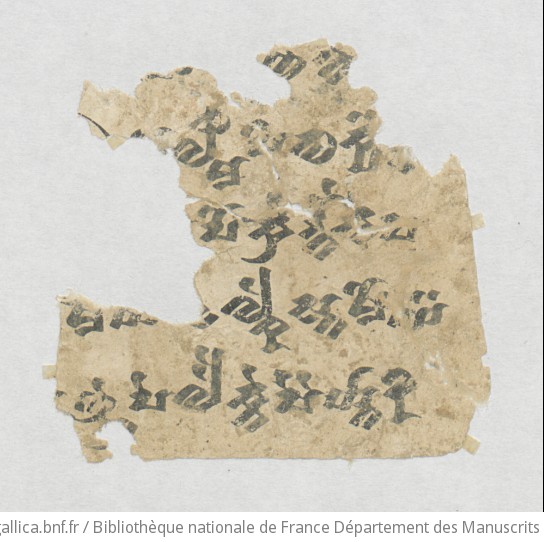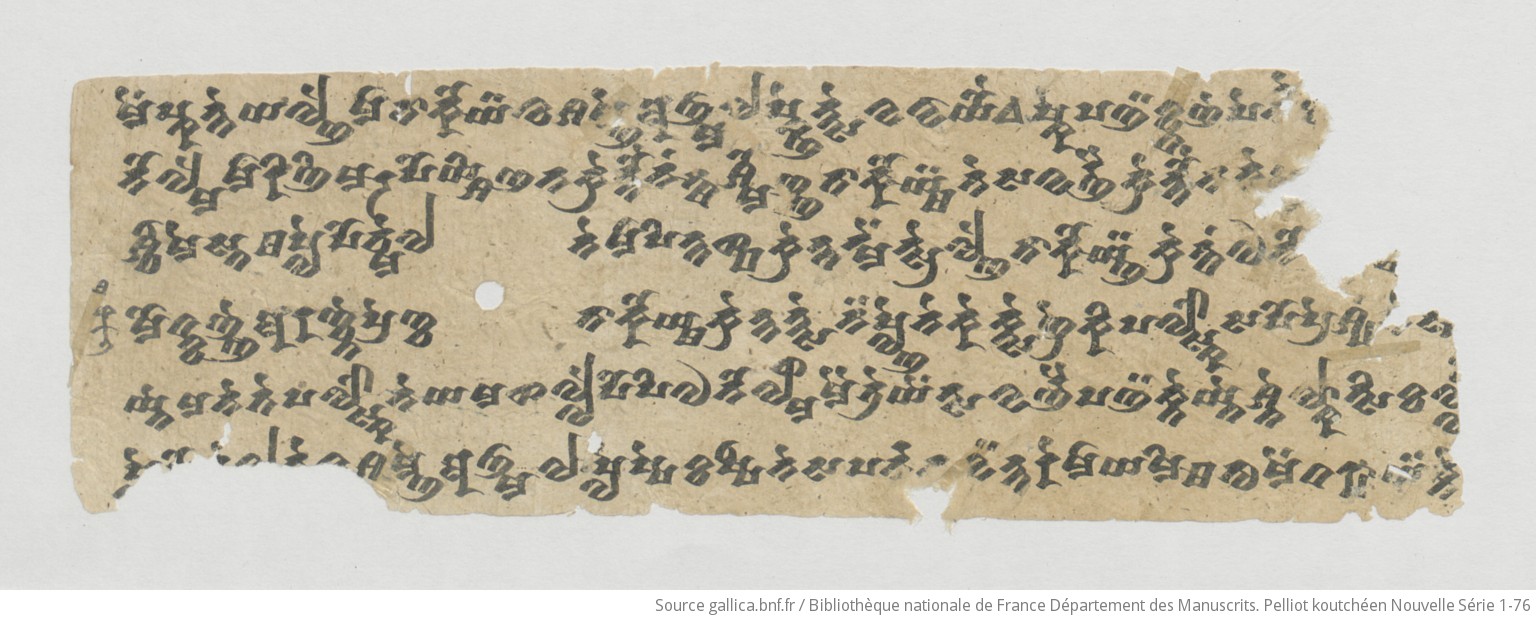| lf | 20 6 |
|---|
| a1 | tne c(·) (–) m· p· ñ· kte ntse kre ntau na ne ko¯ ¯s i me pa lsko ka na s̝aṃ nne to te pi ya¯ ¯cä ka llā s̝s̝a llo na [ta] (– – – – – – –) |
|---|
| a2 | lyñe sa pā la lyñe sa wa rñai ya rke yā mo rmeṃ te a kā¯ ¯lk ñä ṣṣa lle kuce klau tke sa twe a ṣa nī ka sa wā sa[ṃ] (–) [y]· (–) ñ[e] nt[a] (– –) |
|---|
| a3 | ā ke sa śe¯ ¯m • a dhi mā ○ tra po kre ntau na sa ṣa ña¯ ¯ñmä yā ta tai toṃ ñi ña na kre nta yā mo rnta sa po [o] ·[o] lmi pi tu kyä· [n]· |
|---|
| a4 | sa po yo lai ñe nta ntsā ○ ke sa śa nmi yeṃ toṃ kre ntau na ya nmau yo lai ñe ṣa na [s̝a] r[m]a (–) [nau] (– – –) po kre ntau na ṣa |
|---|
| a5 | na s̝s̝a rma na wa rks̝a ltsa na tsä ṅko nme po yo lai ññe nta nä kṣe ñca po kre ntau na ai ṣṣe ñca [p]e ·[ai] (– – –) m[i] y· wa lke sta mo¯ ¯yä |
|---|
| a6 | pe lai kne ntse wa lke sta ma lñe ṣa na s̝a rma na ne po śai ṣe spā rto¯ ¯yä ñi ra no po cme [la] [n]e [ka] (– – –) ñ[ñ]e pe lai kne ṣai ytā ri |
|---|
| b1 | meṃ pka nte ya lñe mā tā ko¯ ¯yä ai śa mñe a ñmā la ṣkñe ntse wa wā yau e ṣke pa ñä kta ñe pe rne [ka] (– –) ta ṅktsi • kre ntau na snai o |
|---|
| b2 | no lme mā ri ñi ma¯ ¯r po yśi ña na kre ntau naṃ¯ ¯ts śmo ñña tā ko¯ ¯ymä te sa wa rñai kre ntau na ne [ā] – – – – ṣa llo na : pta meṃ la ntsī |
|---|
| b3 | ścī me sta ma ṣle po cme la ○ ne mā pi nta s̝pa kre nta nmeṃ tsre lñe tā ko¯ ¯yñä kre ntaṃ o no (–) (·)sa· (– – –) [s̝]pa po cme la ne so |
|---|
| b4 | mo tka ññe a ra ñcne pre ñca ○ tā ko¯ ¯ym kre nta ntse nä ṣlñe ne ke ktse ñre ki pa lsko sa po pre śyaṃ [ne] s[p]· (–) [yma]· : ka ṣiṃ lkā tsi |
|---|
| b5 | yne ma ne te pa lsko ne ya ma s̝a lle po pi o no lmi mai tre yeṃ tsa wa rñai pa ñä kte yne śne lkā tsi ka ll[oṃ] p[l]ā kt·i· cī me sa – |
|---|
| b6 | ṣle ·o c(·)e l· [ne] ai śa mñe a ñmā lā ṣle ṣṣe ka ṣṣī ne sa pa rna k(·)a wä nta re mā ya mi¯ ¯m tu meṃ ta ryā yä kne (– – – – – – – –) |
|---|
| a1+ | As much as one generates memory [and] thinking in the virtues of the Buddha-lord, able in the perfection (of ...) in as much your (pure thoughts) have to be recalled thanks to the teaching. |
|---|
| a2 | After having paid homage starting with praise etc., one should desire the following wish: |
|---|
| a2+ | Through the manner by which you, o venerable one, you have come to the end of (all) evils, [including] the false bad impressions [of the past] savāsanā you ornated yourself beyond any measure with all the virtues, may all the beings through these good deeds of mine precisely in this way go to the end of all evils. |
|---|
| a4 | I will reach these virtues. I will make disappear the causes of evil. |
|---|
| a4+ | All the causes of virtues may they arise vigorously for them. |
|---|
| a5 | May the jewel of the Law which destroys all evils [and] which gives all virtues remain stable for a long time. |
|---|
| a6 | May the whole world evolve according to the causes of the stability of the Law for a long time. |
|---|
| a6+ | For me also in all the births, for sure, from the path of the purity and the Law, may hindrance not occur, guided by the wisdom [and] the compassion until the obtaining of the dignity of Buddha-lord inclusively. |
|---|
| b1+ | May I not give up the virtues without a living being. |
|---|
| b2 | May I become a foundation of the virtues of the omniscient. The wishes for the virtues, starting from this one, are to be wished. |
|---|
| b2+ | In order to leave from the grave (?) [lit. stūpa] the memory should be applied in all births. |
|---|
| b3 | And may the separation from the good ones never happen for me. |
|---|
| b3+ | And in all births may I be the one bearing constantly the (love) for the good living beings. |
|---|
| b4 | May I evolve according to the teaching of the good ones with body, speech [and] mind in all times. |
|---|
| b5 | While going to see the teacher this should be done in the mind: May all the living beings obtain to see in person [lit. in the eyes] the Buddha-lord beginning with Maitreya. |
|---|
| b5+ | It should be (desired) with memory in order to be agreed upon. |
|---|
| b6 | May I never make anything apart from both teachers (that are) wisdom [and] compassion. Thereupon in threefold way ... |
|---|






